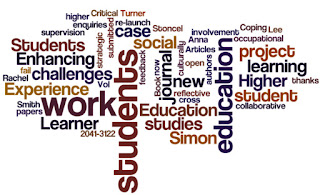 The School of Science and Technology, University of
Northampton has funding from URB@N for three projects. URB@N
stands for ‘Undergraduate Research Bursaries at Northampton’. It is a bursary
scheme offering opportunities for current undergraduate students to participate
in a pedagogic research project taking place at the university. Details
of one of these projects is included here.
The School of Science and Technology, University of
Northampton has funding from URB@N for three projects. URB@N
stands for ‘Undergraduate Research Bursaries at Northampton’. It is a bursary
scheme offering opportunities for current undergraduate students to participate
in a pedagogic research project taking place at the university. Details
of one of these projects is included here.
University 101' for the University
of Northampton
Staff involved:
Nigel Freestone
Sindy Banga - Health
Overview
The project aims to develop and evaluate the on-line
Northampton University
101 transition course. This course has been written to help
new students
and International students to make the transition to The
University of
Northampton successful, easier and effective. It is an
on-line course that
addresses the UK HE academic culture that is new to many
students.
The non-credit bearing course aims to:
• To increase student engagement, retention and academic
performance
• To familiarise students with the UK degree structure,
programmes
and academic expectations e.g. learning outcomes and
assessment
strategies
• Foster a sense of belonging
• Familiarise students with the University of Northampton’s
academic
practices including plagiarism and the grading criteria.
• Introduce the resources and facilities available to
students
• Promote engagement in the curricular
• Help students develop and apply study skills, such as
essay structure
and writing, critical analysis and referencing.
Students would be required to complete Northampton 101
before they
commenced their programme of study. It is anticipated that
Northampton 101
will run for the first two weeks after enrolment, on-line.
This is important in
order to meet the demands of International programmes such
as students
based in India. There will be a number of academic
activities, such as; The
Learning Styles Questionnaire, Turnitin, and a written
activity linked to their
first module.
Student will only be allowed to move on to the next stage
once they have
passed the previous stages.








